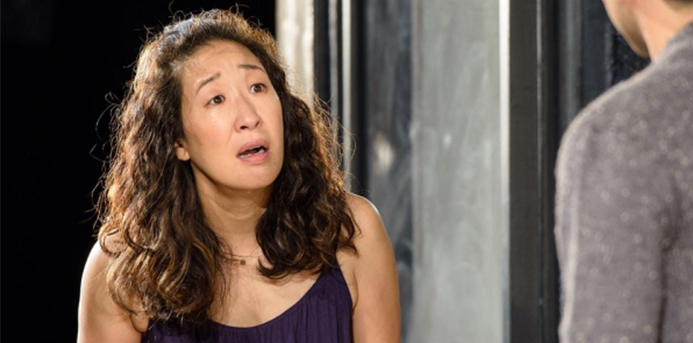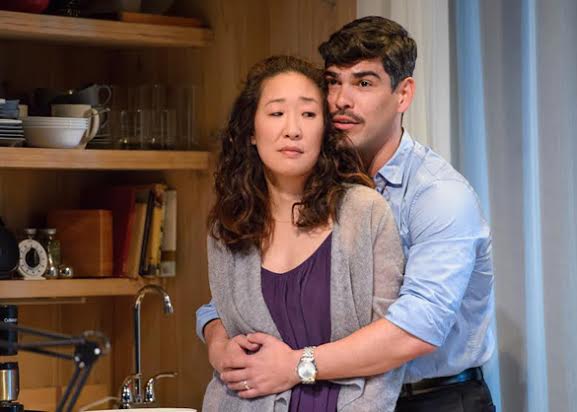Last month, fans of ABC’s “Grey’s Anatomy” said goodbye to Sandra Oh and her uber-talented character, Dr. Cristina Yang.
Their loss is Chicago’s gain.
It might be surprising to some that a popular TV actress would leave a show that’s still doing well, even 10 seasons in, to star in “Death and the Maiden” at a small theater in Chicago, but as Oh told the Chicago Tribune, “I thought, well, I have to leave [“Grey’s”], because I have to go and do this play in Chicago.”
She was also told by Director Chay Yew “…that Chicago audiences are the best in the country, that they really listen in the theater, that they won’t look away or close their eyes and that they like engaging with dark, serious works…”
And this is certainly a dark work. Written by Ariel Dorfman, “Death and the Maiden” opens with Gerardo Escobar (played by Raúl Castillo) returning home to his wife, Paulina Salas (Oh), who cowers behind her large window curtains because she hears another man’s voice. Gerardo explains that his car broke down and a Good Samaritan offered him a ride.
It’s evident, even without any previous knowledge of the play, that Paulina has a problem with men. Things only get worse when the man who helped her husband, Roberto Miranda (played by John Judd), stops by for a visit and ends up staying the night. Getting a look at Roberto’s face while he sleeps, Paulina, without explanation, knocks him out with a pan and ties him up with a power chord right there in her living room.
It eventually comes to light that Paulina had been tortured and raped in a military detention center 15 years earlier, during the country’s old regime. She recognizes Roberto Miranda as one of the doctors who tormented her. He says he’s never seen Paulina before in his life. She shows him the cassette tape of music by Franz Schubert she found in his car and recounts her days in captivity, when Schubert’s “Death and the Maiden” was played.
Complicating all of this is Paulina’s husband’s recent appointment to the president’s commission to investigate the old regime’s crimes. He begs her to let the man go, arguing that he will have to resign due to her actions. Paulina cries, telling her husband that all she wants is a written confession and to be able to listen to her Schubert again.
Many have referred to this production of “Death and the Maiden” as “the play Sandra Oh is in” (myself included), but the two other cast members should not be overlooked. Castillo is brilliant as Paulina’s husband, coming across as worried for both his wife and his job, frustrated to have spent 15 years trying to break down his wife’s walls and suddenly see her come face to face with her demons.
Judd is also a star of Chicago theater, his lengthy bio listing appearances at Goodman, Steppenwolf, Chicago Shakespeare Theater, Writers’ Theatre and more. His portrayal of Roberto Miranda made me second-guess who I really believed.
Unfortunately, the themes of this play are still relevant today. Ariel Dorfman writes in the show’s program, “…it is also sobering to realize that humanity has not managed to learn from the past, that torture has not been abolished, that justice is so rarely served, that censorship prevails, that the hopes of a democratic revolution can be gutted and distorted and warped.
“I can’t help but ask if twenty years from now I will be writing that phrase all over again: this story happened yesterday but it could well be today.”
Hopefully, the answer will be no.
“Death and the Maiden” runs through July 20 at Victory Gardens Theater, 2433 N. Lincoln Ave., Chicago. Tickets can be purchased online or by calling 773-871-3000.


